Archive:Kdenlive/Manual/Transitions/en: Difference between revisions
Importing a new version from external source |
Importing a new version from external source |
||
| Line 76: | Line 76: | ||
<br clear=all> | <br clear=all> | ||
=== Keyframe Animations Using | === Keyframe Animations Using Transitions === | ||
{{#ev:youtube|M8hC5FbIzdE|428|center|Keyframe Animation - Linuceum}} | {{#ev:youtube|M8hC5FbIzdE|428|center|Keyframe Animation - Linuceum}} | ||
Revision as of 08:20, 28 March 2018
Transitions
Transitions govern how Kdenlive cuts from one clip to the next. You can add many different transition effects using Kdenlive's transitions.
How To Add a Transition
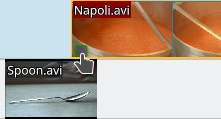
To add a transition, adjust clips in the timeline so that the end of one overlaps the beginning of another.
To add a transition, adjust clips in the timeline so that the end of one overlaps the beginning of another.
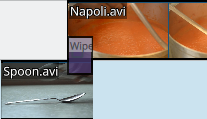
Then right-click in the timeline at the overlap point, select , then choose one of the transitions from the flyout.
Properties Tab (version >= 15.12)
In kdenlive version 15.12 the effect stack is merged with the "Transition" Tab to create a "Properties" window/tab.
The Properties window displays the settings for the effects on the currently selected clip (Figure 1) or the settings for the currently selected transition (Figure 2) depending on whether it is a clip or a transition that is currently selected.
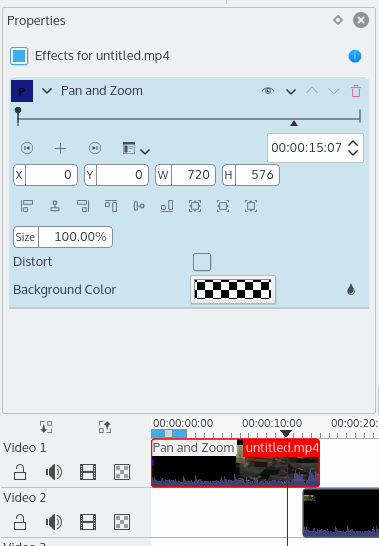 |
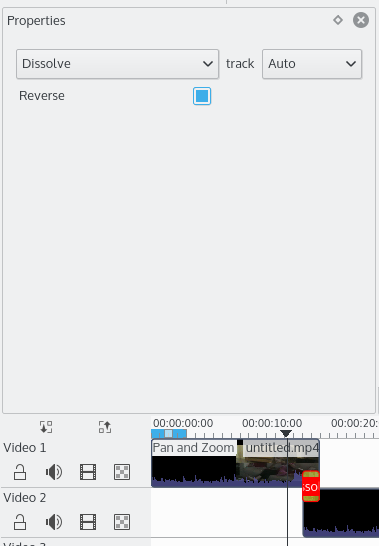 |
If you select the transition in the timeline  its properties will appear in the Properties tab (Figure 2).
its properties will appear in the Properties tab (Figure 2).
You should preview your transition to make sure it is running in the direction you expect. For example, if it is a Dissolve transition and it is running in the correct direction, then the first clip should dissolve into the second clip. But if it is in the wrong direction, the first clip will suddenly disappear (replaced by the second track). It will then fade back in and abruptly jump to second clip. If your transition is in the wrong direction, just select the Reverse check box in the Properties tab.
Transition Tab (pre version 15.12)
If you select the transition in the timeline  its properties will appear in the Transition tab.
its properties will appear in the Transition tab.
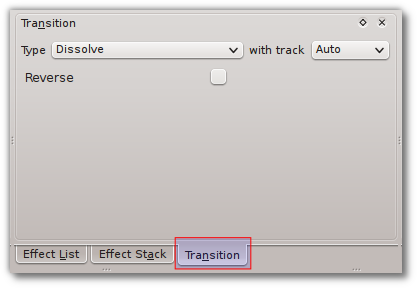
If the Transition dialog is not visible, use to add it.
You should preview your transition to make sure it is running in the direction you expect. For example, if it is a Dissolve transition and it is running in the correct direction, then the first clip should dissolve into the second clip. But if it is in the wrong direction, the first clip will suddenly disappear (replaced by the second track). It will then fade back in and abruptly jump to second clip. If your transition is in the wrong direction, just select the check box in the Transition tab.
How to create transitions with a single click
There is a shortcut for creating transitions between two tracks that overlap.
In Version 17.04 you hover the mouse over the lower grey rectangle that appears at the end of the clips on the timeline and a tool tip will appear saying "Click to add Transition". If you click a dissolve transition will be automatically added.
{{#ev:youtube|e1f0Yc8Fh3c}}
Older Versions: If you hover the mouse over the overlapping region on the timeline, a green triangle will appear. Clicking this adds a dissolve transition between the tracks.
{{#ev:youtube|h1k7GbEssqA}}
Automatic Transitions
If a transition is set as an "Automatic Transition" and you adjust the overlap between the two clips involved in the transition, then the length of the transition will automatically adjust to cover the region where the clips overlap.
You can toggle off this feature on a transition by selecting the transition and choosing Automatic Transition from the menu.
Transitions will be created with the Automatic transition property set to true by default if the Automatic Transitions Button is active.
When Automatic Transition is off and you move a clip to change the overlapping region, then the length of the transition does not automatically adjust.
Mixing titles, images and Videos with Transitions
{{#ev:youtube|f6VHlOZutm8|500|left|Image and Title Layers Transparency Tutorial - qubodupl/Open Source Bug}}
{{#ev:youtube|f6VHlOZutm8|500|left|Image and Title Layers Transparency Tutorial - qubodupl/Open Source Bug}}
Keyframe Animations Using Transitions
{{#ev:youtube|M8hC5FbIzdE|428|center|Keyframe Animation - Linuceum}}
List of Transitions
See also Effects and Transitions for an alphabetical list of effects and transitions.
See also alpha operation transitions for a comparison of the various alpha operation-type transitions (addition, addition_alpha, alphaatop, alphain, alphaout, alphaover and alphaxor) .
- addition
- addition_alpha
- Affine
- alphaatop
- alphain
- alphaout
- alphaover
- alphaxor
- burn
- Cairo Affine Blend
- Cairo Blend
- color_only
- Composite
- Composite and transform
- darken
- difference
- Dissolve
- dodge
- grain_extract
- hardlight
- Hue
- lighten
- Matte
- multiply
- overlay
- Region
- Saturation
- screen
- Slide
- softlight
- subtract
- UV Map
- value
- Video Quality Measurement
- Wipe
FAQ
Q: How to add a cross fading effect?
A: Make clips on two tracks overlap in time, then click the green triangle flashing in the bottom corner of the top clip (see Transition).
